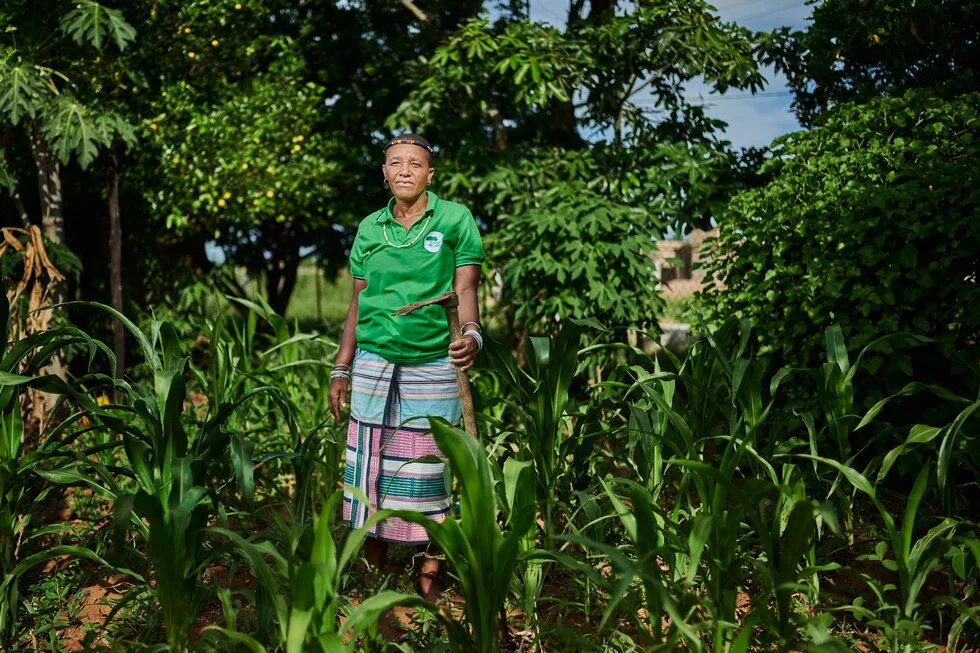Mphatheleni was born in Venda to a father who was a traditional healer, community leader and farmer. He raised her with a deep indigenous spiritual knowledge which she has carried with her throughout her life. However, growing up in a modern, capitalist society, shaped by apartheid and colonialism she found herself distanced from her traditional values and by the time she finished her education, she was ready to reassess.

Once Mphathi had finished university, she returned to her community with a deep sense of being lost in the modern world and around this time, she became very unwell and was diagnosed with pulmonary TB and admitted to the hospital for treatment.
After a short period, she discharged herself from the hospital, deciding to live alone in the mountains for 2 years, eating all-natural food, breathing fresh air and drinking water from the streams.
Although she continued to return to the hospital for regular check-ups, she took her health into her own hands, informed by traditional ways of living. Within the first year, she had regained her health through a combination of healthy living, modern medication and hospital visits.
In 1998, together with the community, Mphathi started “Mupo,” a programme aimed at organising community elders, youth and children to remember the indigenous knowledge and value of Nature. The objective was to revive and practice indigenous systems and teach spirituality as the guidance of life. It was a space where people would visit with an open mind to engage.
“You cannot disconnect from the indigenous ways, everything embraces that knowledge. For the VhaVendha people, everything we do is connected with spirituality and our ancestors' ways. “
Mphatheleni is passionate about inter-generational learning to revive indigenous knowledge and practices through community dialogues, workshops and research techniques.
As part of her training, she travelled to the Amazon in 2006 and 2008 to learn about reviving indigenous knowledge. In Colombia, she learnt about eco-mapping, a way to represent a community's relationship to the world around them visually.
Through community dialogues, a territory is drawn, from the largest to the smallest elements, the mountains to the stones and insects. The past, present and future are mapped out through memories and projections, and discussions are facilitated about what has been lost, and what needs to be regained for society to be healthy.
The process includes traditional healing, commons (how people live together), the importance of animals, and climate change. It gives people an overview of who they are and where they live. Every community finds its unique vision of what it has lost and what it wants to bring back.
“A lot of life has been lost in the mountains. Animals have been displaced, rivers are no longer flowing, and the habitat is no longer the same. When we do eco-mapping we can see climate change. We map the territory and the seasonal calendar. Rain has changed, and plants are not bearing fruit, the rivers are getting dry. We have lost who we are. At the centre of the huge circle of everything is the human being. “
Mupo is focussing on eco-mapping in different areas around Venda to teach the youth about the severe challenges of food and water security. Mphathi, who has been involved in sessions of eco-mapping in the Eastern Cape, Humansdorp and Jefrreysbay, believes that if they can connect the dots between the source of the water, the land, food and seed systems, they can start to develop a deep, meaningful connection to their environment, and work to protect it for future generations.
The importance of eco-mapping cannot be underestimated. Particularly key for South Africans is that it allows communities to reclaim their histories, their connection to land and resources that were stolen through apartheid and colonialism. It facilitates the building of a collective shared narrative that is the basis of community power and contributes towards the ability to engage meaningfully with developers, the state, or other groups. Recently it has been used as a tool for challenging the Musina-Makhado Special Economic Zone (MMSEZ) and preparing communities in the Eastern Cape for meaningful engagement on issues relating to nuclear, gas, oil and H2.
This story is one of a series of articles produced by The Actionists in collaboration with the Heinrich Boell Foundation's Cape Town office to highlight the incredible work of organisations and activists across South Africa in their pursuit of justice and equal rights for all.